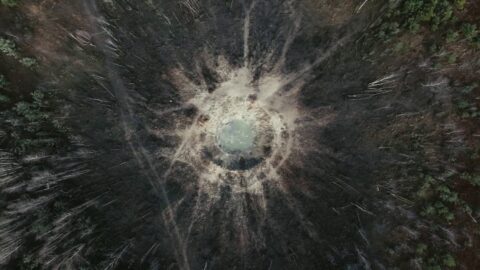Whether it’s unexploded WW2 bombs found in Cologne during road construction, or mass graves from that same war found 100 miles north of Warsaw, or mines still being removed to this day in Bosnia following the Balkan war in the 90s, it’s worth reflecting on the fact that war and conflict is not something that merely lasts a few years before ending. Instead, it seeps into the very fabric of the soil, contaminating our world and leaving scars for decades, maybe centuries, to follow.
With a mixture of drone footage and traditional camerawork, both static and handheld, Dmytro Hreshko creates a disturbing feature-length montage of Russian-inflicted destruction in Divia (2025). From buildings flattened into nothing to reams and reams of dead animals to ravaged forests to endless no-go zones thanks to Russian mines, this patient, upsetting movie lays bare the devastating cost of this needless, pointless invasion. Not just genocide, but ecocide too.
There is no narration and no titles. Just a simple use of montage scored to the powerful experimental music of Sam Slater, its atonal strings and electronic rumblings attempting to portray the unsayable, a truly vast evil inflicted upon this beautiful land. And neither is there anything particularly associated with the resistance symbols of Ukraine; no flag, no soldiers, no graves, no graffiti. Instead, we see everyday workers attempt to restore some normalcy to a battered Ukrainian ecosystem.
One image of a missile being removed from the ground, where it is wedged in like a phallus, will be stuck in my mind for a long time. It’s a potent symbol of how the Russian army are raping the land, attempting to make it unusable and ruining it forever. And the Z etched onto burnt-out tanks is the 21st-century swastika, a symbol of the hollow futility and senselessness of the Putin regime. But there is a great humanity here too, including touching footage of an animal worker putting out some food for a cat, completely bewildered amongst the rubble.
This is not just art, but a vital work of documentation, providing clear and unobjectionable evidence of the ongoing ecocide. If the powers that be are ever put to trial, it is important documents like this that will hopefully display just how devastating their campaign of death has been. That day can’t come soon enough. With all respect to the filmmakers, I wish we didn’t need films like this.
Redmond is the editor-in-chief of Journey Into Cinema.

